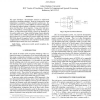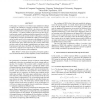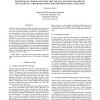117
click to vote
ICASSP
2011
IEEE
14 years 5 months ago
2011
IEEE
Speech recognition applications are known to require a significant amount of resources (memory, computing power). However, embedded speech recognition systems, such as in mobile p...
122
click to vote
ICASSP
2011
IEEE
14 years 5 months ago
2011
IEEE
This paper introduces a discriminative extension to whole-word point process modeling techniques. Meant to circumvent the strong independence assumptions of their generative prede...
136
click to vote
ICASSP
2011
IEEE
14 years 5 months ago
2011
IEEE
Unsupervised acoustic model training has been successfully used to improve the performance of automatic speech recognition systems when only a small amount of manually transcribed...
116
click to vote
ICASSP
2011
IEEE
14 years 5 months ago
2011
IEEE
In this paper, we propose a novel feature space adaptation technique to improve the robustness of speech recognition in noisy environments. Histogram equalization (HEQ) is an effe...
INTERSPEECH
2010
14 years 9 months ago
2010
This paper presents an improved wavelet-based dereverberation method for automatic speech recognition (ASR). Dereverberation is based on filtering reverberant wavelet coefficients...
EMNLP
2007
15 years 3 months ago
2007
We present a maximally streamlined approach to learning HMM-based acoustic models for automatic speech recognition. In our approach, an initial monophone HMM is iteratively refin...
106
click to vote
ICASSP
2008
IEEE
15 years 8 months ago
2008
IEEE
Automatic speech recognition (ASR) systems have been developed only for a very limited number of the estimated 7,000 languages in the world. In order to avoid the evolvement of a ...
111
click to vote
ICASSP
2009
IEEE
15 years 8 months ago
2009
IEEE
For effective training of acoustic and language models for spontaneous speech such as meetings, it is significant to exploit the texts available in a large scale, which may not b...



